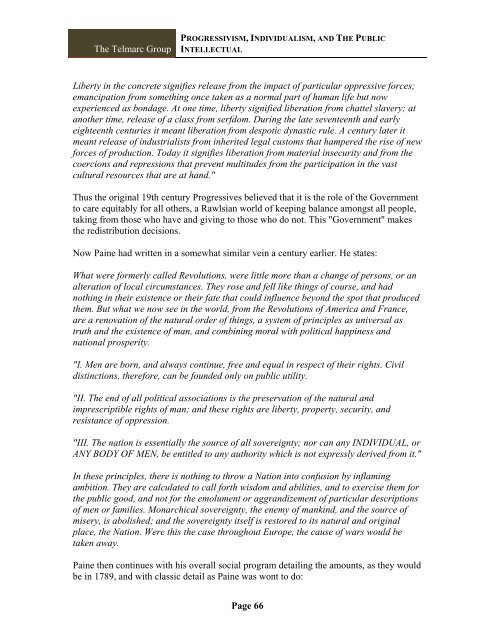progressivism, individualism, and the public ... - Telmarc Group
progressivism, individualism, and the public ... - Telmarc Group
progressivism, individualism, and the public ... - Telmarc Group
Create successful ePaper yourself
Turn your PDF publications into a flip-book with our unique Google optimized e-Paper software.
The <strong>Telmarc</strong> <strong>Group</strong><br />
PROGRESSIVISM, INDIVIDUALISM, AND THE PUBLIC<br />
INTELLECTUAL<br />
Liberty in <strong>the</strong> concrete signifies release from <strong>the</strong> impact of particular oppressive forces;<br />
emancipation from something once taken as a normal part of human life but now<br />
experienced as bondage. At one time, liberty signified liberation from chattel slavery; at<br />
ano<strong>the</strong>r time, release of a class from serfdom. During <strong>the</strong> late seventeenth <strong>and</strong> early<br />
eighteenth centuries it meant liberation from despotic dynastic rule. A century later it<br />
meant release of industrialists from inherited legal customs that hampered <strong>the</strong> rise of new<br />
forces of production. Today it signifies liberation from material insecurity <strong>and</strong> from <strong>the</strong><br />
coercions <strong>and</strong> repressions that prevent multitudes from <strong>the</strong> participation in <strong>the</strong> vast<br />
cultural resources that are at h<strong>and</strong>."<br />
Thus <strong>the</strong> original 19th century Progressives believed that it is <strong>the</strong> role of <strong>the</strong> Government<br />
to care equitably for all o<strong>the</strong>rs, a Rawlsian world of keeping balance amongst all people,<br />
taking from those who have <strong>and</strong> giving to those who do not. This "Government" makes<br />
<strong>the</strong> redistribution decisions.<br />
Now Paine had written in a somewhat similar vein a century earlier. He states:<br />
What were formerly called Revolutions, were little more than a change of persons, or an<br />
alteration of local circumstances. They rose <strong>and</strong> fell like things of course, <strong>and</strong> had<br />
nothing in <strong>the</strong>ir existence or <strong>the</strong>ir fate that could influence beyond <strong>the</strong> spot that produced<br />
<strong>the</strong>m. But what we now see in <strong>the</strong> world, from <strong>the</strong> Revolutions of America <strong>and</strong> France,<br />
are a renovation of <strong>the</strong> natural order of things, a system of principles as universal as<br />
truth <strong>and</strong> <strong>the</strong> existence of man, <strong>and</strong> combining moral with political happiness <strong>and</strong><br />
national prosperity.<br />
"I. Men are born, <strong>and</strong> always continue, free <strong>and</strong> equal in respect of <strong>the</strong>ir rights. Civil<br />
distinctions, <strong>the</strong>refore, can be founded only on <strong>public</strong> utility.<br />
"II. The end of all political associations is <strong>the</strong> preservation of <strong>the</strong> natural <strong>and</strong><br />
imprescriptible rights of man; <strong>and</strong> <strong>the</strong>se rights are liberty, property, security, <strong>and</strong><br />
resistance of oppression.<br />
"III. The nation is essentially <strong>the</strong> source of all sovereignty; nor can any INDIVIDUAL, or<br />
ANY BODY OF MEN, be entitled to any authority which is not expressly derived from it."<br />
In <strong>the</strong>se principles, <strong>the</strong>re is nothing to throw a Nation into confusion by inflaming<br />
ambition. They are calculated to call forth wisdom <strong>and</strong> abilities, <strong>and</strong> to exercise <strong>the</strong>m for<br />
<strong>the</strong> <strong>public</strong> good, <strong>and</strong> not for <strong>the</strong> emolument or aggr<strong>and</strong>izement of particular descriptions<br />
of men or families. Monarchical sovereignty, <strong>the</strong> enemy of mankind, <strong>and</strong> <strong>the</strong> source of<br />
misery, is abolished; <strong>and</strong> <strong>the</strong> sovereignty itself is restored to its natural <strong>and</strong> original<br />
place, <strong>the</strong> Nation. Were this <strong>the</strong> case throughout Europe, <strong>the</strong> cause of wars would be<br />
taken away.<br />
Paine <strong>the</strong>n continues with his overall social program detailing <strong>the</strong> amounts, as <strong>the</strong>y would<br />
be in 1789, <strong>and</strong> with classic detail as Paine was wont to do:<br />
Page 66












